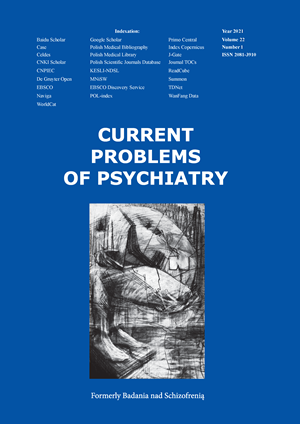The ketogenic diet: a co-therapy in the treatment of mood disorders andobesity - a case report
DOI:
https://doi.org/10.2478/cpp-2021-0002Keywords:
ketogenic diet, mood disorders, depression, nutritional psychiatry, dietAbstract
Introduction: There has been a growing interest in the ketogenic diet (KD) due to its suggested therapeutic potential to support numerous chronic diseases. KD is characterized by high amounts of fats and a reduced amount of carbohydrates and protein intake. During following the nutrition protocol, ketones are synthesised, which are the primary source of energy. The elevated concentration of ketones in blood serum inhibits hunger, what leads to reduced body weight. Some authors suggest KD has antidepressant potential and could stabilise mood by affecting neurotransmitters homeostasis in the central nervous system.
Material and methods: The aim of the study was to assess the effect of KD on body weight reduction and improvement of mood in the patients with mood disorder diagnosis. To interpret the results of nutritional intervention, the laboratory parameters and structuralised scales and questionnaires were used.
Results: After following 4-week therapy, the reduction of body weight, correction of some laboratory measurements and reduction in mood symptoms were noticed.
Conclusions: The ketogenic diet affects the anthropometric measurements. However, a variety of simultaneous therapeutic approaches makes impossible determination of the effect on depressive symptoms.
References
1. Hruby A, Hu FB. The epidemiology of obesity: A big picture. Pharmacoeconomics. 2015;33:673-689.
2. Pi-Sunyer X. The medical risk of obesity. Postgraduate Medicine 2009;121:21-33.
3. Harvey KL, Holcomb LE, Kolwicz SCJr. Ketogenic Diets and Exercise Performance. Nutrients. 2019;11:2296.
4. Owen OE, Morgan AP, Kemp HG, Sullivan JM, Herrera MG, Cahill GFJr. Brain metabolism during fasting. J Clin Invest1967;46:1589-1595.
5. Longo R, Peri C, Cricri D, Coppi L, Caruso D, Mitro N, et al. Ketogenic Diet: A New Light Shining on Old but Gold Biochemistry. Nutrients. 2019; 11(10):2497.
6. Murray RK, Granner KD, Rodwell WV. Biochemia Harpera. Warszawa PZWL. 2015.
7. Gershuni VM, Yan SL, Medici V. Nutritional Ketosis for Weight Management and Reversal of Metabolic Syndrome. Curr Nutr Rep. 2018;7(3):97-106.
8. van der Louw E, van den Hurk D, Neal E, Leiendecker B, Fitzsimmon G, Dority L, et al. Ketogenic diet guidelines for infants with refractory epilepsy. Eur J Paediatr Neurol. 2016;20(6):798-809.
9. Wlodarek D. Role of Ketogenic Diets in Neurodegenerative Diseases (Alzheimer’s Disease and Parkinson’s Disease). Nutrients. 2019;11(1):169.
10. Dhatariya K. Blood Ketones: Measurement, Interpretation, Limitations, and Utility in the Management of Diabetic Ketoacidosis. Rev Diabet Stud. 2016;13(4):217-225.
11. Gibson AA, Seimon RV, Lee CMY, Ayre J, Franklin J, Markovic TP, et al. Do ketogenic diets really suppress appetite? A systematic review and meta - analysis. Obes Rev. 2015;16:64-76.
12. Masood W, Annamaraju P, Uppaluri KR. Ketogenic Diet. StarPearls Publishing [Internet]. 2020.
13. Brietzke E, Mansur, RB, Subramaniapillai M, Balanza-Martinez V, Vinberg M, Gonzalez-Pinto A, et al. Ketogenic diet as a metabolic therapy for mood disorders: evidence and developments. Neurosci Biobehav Rev. 2018;94:11-16.
14. Bueno NB, de Melo IS, de Oliveira SL, da Rocha Ataide T. Very-low-carbohydrate ketogenic diet v. Low-fat diet for long-term weight loss: A meta-analysis of randomised controlled trials. Br.J. Nutr. 2013;110:1178-1187.
15. Yancy WSJr, Almirall D, Maciejewski ML, Kolotkin RL, McDuffie JR, Westman EC. Effects of two weight-loss diets on health-related quality of life. Qual Life Res. 2009;18:281-289.
16. Luscher B, Shen Q, Sahir N. The GABAergic Deficit Hypothesis of Major Depressive Disorder. Mol Psychiatry. 2011;16(4): 383-406.
17. Brinkworth GD, Nokes M, Clifton PM, Buckley JD. Effects of a low carbohydrate weight loss diet on exercise capacity and tolerance in obese subjects. Obesity. 2009;17:1916-1923.
18. Lefevre F, Aronson N. Ketogenic diet for the treatment of refractory epilepsy in children: A systematic review of efficacy. Pediatrics. 2000;105:E46.
19. Grigolon RB, Gerchman F, Schoffel AC, Hawken ER, Gill H, Vasquez GH, et al. Mental, emotional, and behavioral effects of ketogenic diet for non-epileptic neuropsychiatric conditions. Prog Neuropsychopharmacol Biol Psychiatry. 2020;30:102:109947.
20. Carmen M, Safer DL, Saslow LR, Kalayjian T, Mason AE, Westman EC, et al. Treating binge eating and food addiction symptoms with low -carbohydrate Ketogenic diets: a case series. J Eat Disord. 2020;8:2.
21. Opie RS, O’Neil A, Itsiopoulos C, Jacka FN. The impact of whole-of-diet interventions on depression and anxiety: A systematic review of randomised controlled trials. Public Health Nutr. 2015;18(11):2074-2093.
22. Murphy P, Likhodii S, Nylen K, Burnham WM. The antidepressant properties of the ketogenic diet. Biol Psychiatry. 2004;15;56:981-983.
23. Jacka FN, O’Neil A, Opie R, Itsiopoulos C, Cotton S, Mohebbi M, et al. A randomised controlled trial of dietary improvement for adults with major depression (the ‘SMILES’ trial). BMC Med. 2017;15(1):23.
24. Dashti H, Matthew T, Hussein T, Asfar SK, Behbahani A, Khoursheed MA, et al. Long-term effects of a ketogenic diet in obese patients. Exp. Clin Cardiol. 2004;9:200-205.
Downloads
Published
Issue
Section
License
Copyright (c) 2021 Authors

This work is licensed under a Creative Commons Attribution 4.0 International License.


